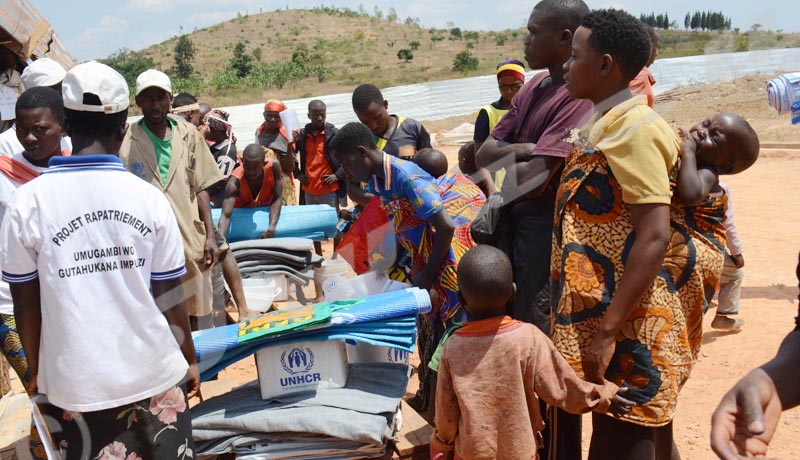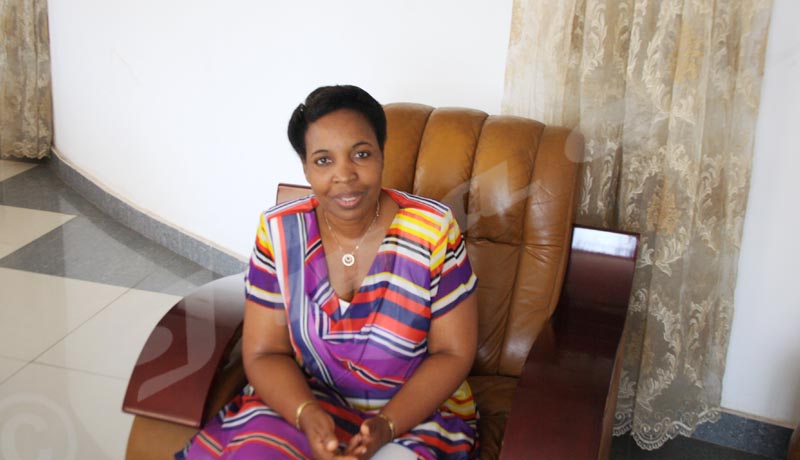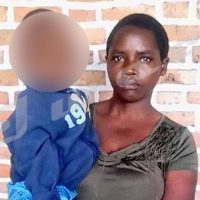Lack of adequate shelter and seeds, extreme poverty … are among other challenges faced by Makamba residents recently repatriated from Tanzania. However, the administration reassures.

Returnees receive a return package when they come back to the country from UNHCR and the government
Some dilapidated houses covered with grass and tents cover Muyaga hill in Kayogoro commune. It is at 16 km from the offices of Kayogoro commune in Makamba province. These houses are occupied by more than twenty families recently repatriated from Tanzania.Frédéric Nkurunziza, father of six children, lives on this hill in a house of 7m out of 3 m covered with grass. “I borrowed it from my brother who went to live in Bujumbura the capital. Mine is completely destroyed”, he says.
He also says few homes of returnees are in good condition in that locality: “Even if they are not completely destroyed, the rain does not facilitate the task. During the night we have to move, otherwise we may sleep in the water”.
Mr. Nkurunziza asks the government to honor its commitments: “When we returned to the country, we were promised to have metal sheets to cover our homes. But those who live near the commune offices benefit first from the assistance of the administration. Those who live in the far corners are sometimes forgotten.”
Gilbert Nitereka, another returnee from the same hill and father of eight, complains that when they returned from Tanzania last June, their arable lands were occupied by their families. “They grabbed our lands. Not only did they not give us our harvest, but they refuse to give us our lands”, he says adding that it’s not also easy to have seeds.
Due to poverty in this community, students also become victims. “Even though our children had the chance to join the school, they did not have the necessary school kit,” he says. According to him, some go to school without wearing uniform.
“Promise is a debt”
The situation is similar to returnees from Butare hill in Kayogoro commune of Makamba province. Christine Nyandwi, a mother of four, reports that the government has promised six months of assistance: “We received the assistance that only lasted three months more than a year ago. We are waiting for the other part.”
In addition to the return package distributed in the transit center in Mabanda commune of Makamba province, these returnees also received 10 kg of rice. The return package is composed of money ($ 60 for an adult and $ 40 for children under 18), food, non-food items, cooking utensils, hoes…. “We did not have any other support and the harvest is not at all good following the overwhelming sun observed during the past cropping season.
For her, the government should honor its commitments. “We want to get out of this poverty and have well covered homes,” she says
Colette Nzeyimana, widow and mother of four, from Butare hill, also shares the same view. Fled to Tanzania in 2016, she returned to Burundi in September 2017. Arriving at home, she found that all her fields were harvested by the neighbors. “Unfortunately, I have not yet been able to work again in my fields, following a long illness. My children may starve,” he bleakly says.
Nzeyimana says the administration had promised to give them metal sheets and continue to assist them. “We waited, in vain. The tents that cover our houses are in a bad state”.
Zachée Misago, administrator of Kayogoro commune, indicates that the administration has identified 18 most vulnerable families who have recently received metal sheets. He says the investigation continues, the others will be served. “But they are few, because their houses have been well kept during their absence.”
Mr. Misago also says that for more than 3,000 refugees who have already returned, most of them come from the border hills of Tanzania, especially Bigina, Gatabo and Mugina. “They live well with the residents; no problem has been raised yet,” he says adding that UNHCR, in collaboration with the government, gave them the return package.
He adds that the Ministries of Home Affairs and Social Affairs gave them food assistance.
Mr. Misago also said that local associations are involved in socio-economic adaptation to help them get out of poverty. “Local residents are trying to do everything to get out of poverty. If someone sells vegetables, another sells peanuts, clothes … they are doing well. I think they will succeed.”
“No walls under construction, no sheets”
Gad Niyukuri, governor of Makamba province, said those who had sold their roofs or whose sheets had been blown away by the wind or rain received assistance from the government and UNHCR. Concerning more than 57 thousand refugees already returned to the country, they don’t have any particular problem.

Ms. Gloriose Berahino: “It’s an ongoing process; others will receive soon the assistance”

Ms. Gloriose Berahino: “It’s an ongoing process; others will receive soon the assistance”
Gloriose Berahino, director general in charge of repatriation at the Ministry of Home Affairs says all vulnerable returnees already identified have benefited from metal sheets to cover their homes. “Once the walls of a house are under construction, the beneficiaries are immediately registered to receive metal sheets. Otherwise, they will probably sell them,” she explains.
She also says about 20 families identified as vulnerable in Kayogoro commune also received metal sheets last week. “It’s an ongoing process.
Others will receive it shortly”, she says. According to her, those who have not yet had sheets are those who returned to the country on their own. For the six-month assistance mentioned, Ms. Berahino reveals that her management team had been lobbying for a six-month period. However, she only got it for three months. “So they have to be content with what they have had, we have no other choice,” she concludes.



















 IWACU Open Data
IWACU Open Data

